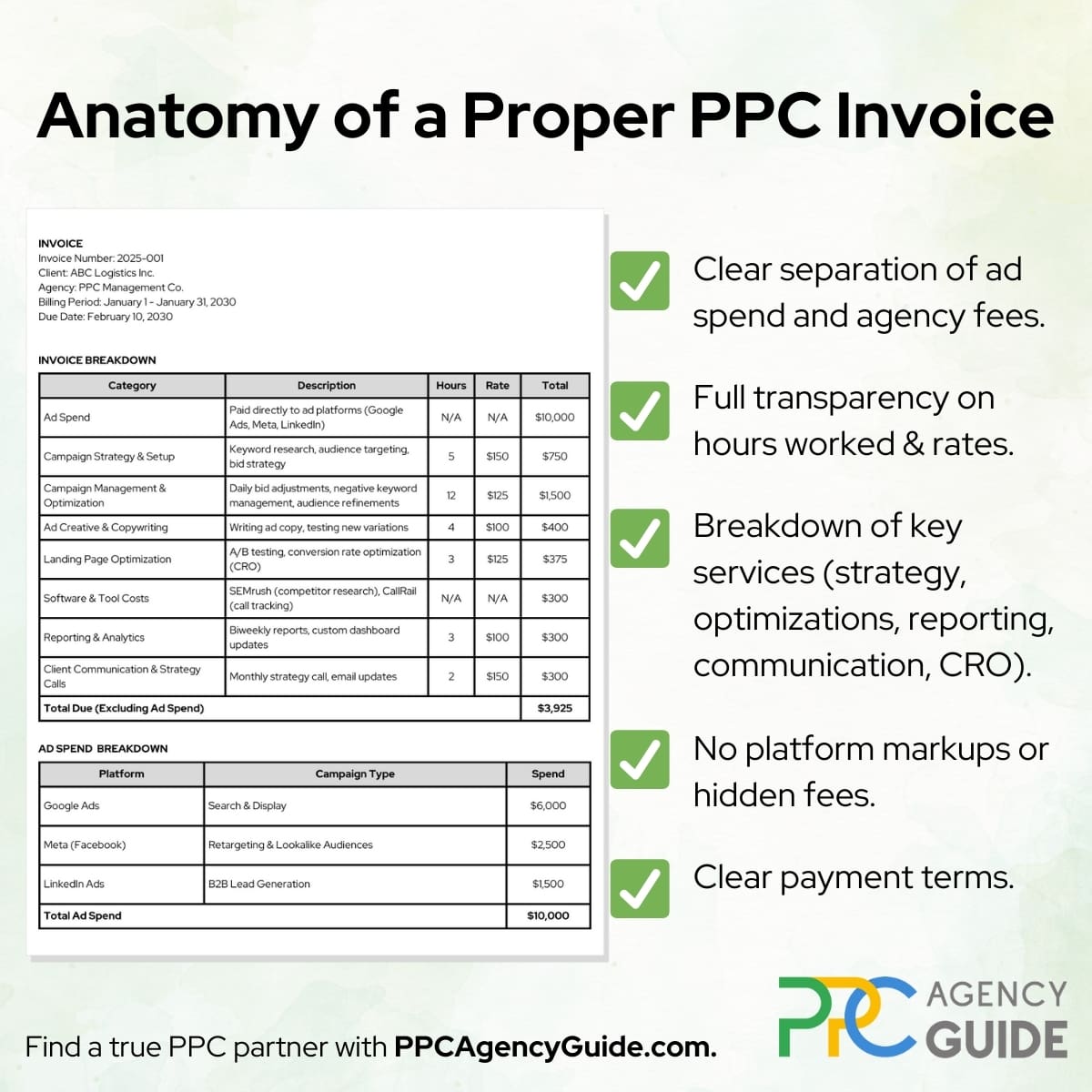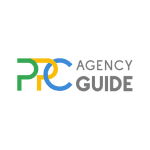
Have you ever looked at a PPC agency invoice and thought, “What exactly am I paying for?”
You’re not alone. Many business owners struggle to decipher agency fees, hidden costs, and whether they’re getting their money’s worth. With so many different pricing structures, from flat fees to percentage-based and performance-driven models, it’s easy to feel lost.
However, understanding PPC invoicing can help you budget smarter, negotiate better, and ensure your ad dollars are driving real results.
In this guide, we’ll break down PPC agency fees, uncover common pricing models, highlight hidden costs to watch for, and help you determine if your agency’s fees align with your business goals.
The Core Components of a PPC Invoice
PPC agency invoices may look different, but most include a mix of ad spend, management fees, software costs, and additional service charges. Understanding these line items will help you determine where your budget is going and whether you’re getting the value you expect. Let’s break it down.

Ad Spend vs. Agency Fees
This is the most important distinction on your invoice.
- Ad Spend: The amount paid directly to platforms like Google Ads, Meta (Facebook and Instagram), LinkedIn, Microsoft Ads, and TikTok. Your agency does not keep this money. It goes to the ad network.
- Agency Fees: Charges for the agency’s work, covering campaign strategy, execution, and optimization.
PPC Management Fees
Your management fee covers the services your PPC agency provides to run and optimize your campaigns. These typically include:
- Campaign Setup and Strategy: Includes keyword research, audience targeting, and structuring campaigns for optimal performance.
- Ad Creative and Copywriting: Covers crafting headlines, descriptions, and display ads to improve engagement and conversions.
- Bid Management and Budget Allocation: Ensures ad spend is distributed effectively to maximize return on investment.
- Landing Page Optimization: Focuses on improving the experience and effectiveness of the pages users land on after clicking an ad.
- A/B Testing: Compares different versions of ads or landing pages to refine performance and improve results over time.
- Analytics and Reporting: Provides performance insights, trend analysis, and strategic recommendations for continuous improvement.
The exact services included in your management fee can vary depending on the agency’s pricing model, level of service, and industry specialization.
Media Buying and Platform Markups
Some agencies offer media buying services, handling ad placements across Google Display Network, YouTube, programmatic platforms, and social media.
- Percentage-Based Fees: Some agencies charge a percentage of ad spend as a service fee.
- Platform Markups: Others mark up media costs and bill you at a higher rate than what platforms actually charge.
If your invoice shows a lump sum for ad spend, ask for a detailed breakdown by platform.
Software and Tool Costs
Many PPC agencies use third-party tools to enhance campaign performance, automate processes, and track results. These tools may be included in your management fee or billed separately.
- Competitor Research: Tools like Semrush and SpyFu are used to analyze competitor keywords, ad strategies, and market trends.
- Automation and Bid Optimization: Software like Optmyzr and Adalysis help agencies adjust bids, automate optimizations, and improve efficiency.
- Landing Page Testing: Platforms such as Unbounce and Instapage enable A/B testing and conversion rate optimization.
- Call Tracking and CRM Integration: Programs like CallRail track phone call conversions and integrate leads into customer relationship management (CRM) systems like HubSpot.
Ask if these tools are included in your agency’s fee or if you are being charged separately. Some agencies bundle software costs into their pricing, while others pass them directly to clients. Understanding this breakdown ensures you’re not paying for tools you don’t need or already have access to.
Common PPC Pricing Models and How They Impact Your Invoice
PPC agencies use different pricing models to structure their fees. The model an agency follows can significantly impact how much you pay and how aligned their incentives are with your business goals.
- Flat-Fee Pricing: A fixed monthly fee for managing your campaigns. This model offers predictability but does not always encourage ongoing performance improvements.
- Percentage of Ad Spend: Fees are based on a percentage of your total ad spend. While this scales with your budget, it can inflate costs if the agency focuses on spending more rather than improving efficiency.
- Hybrid Pricing: A combination of a fixed management fee and a performance-based incentive. This model balances stability with motivation for better results.
- Results-Based Pricing: Agencies charge based on specific outcomes such as lead volume, return on ad spend (ROAS), or sales. While this aligns costs with success, it may lead to agencies prioritizing short-term wins over long-term growth.
Each model has its pros and cons, so it’s important to evaluate which structure best aligns with your business objectives and budget.
Hidden Fees You Need to Watch For
Some agencies include extra charges that can significantly impact your overall costs. Here are key fees to look out for on your PPC invoice.
Account Setup Fees
Some agencies charge an initial fee to set up your campaigns, install tracking pixels, and configure analytics. While reasonable setup costs are standard, excessive fees may be a red flag, especially if the agency locks you into a long-term contract.
Platform Markups
Some agencies bill you a higher rate than what the ad platform actually charges. This means you could be paying more for ad spend without realizing it. Always ask if you’ll receive direct invoices from platforms like Google Ads and Meta to ensure transparency.
Reporting and Data Access Fees
You should not have to pay extra to see how your campaigns are performing. Some agencies charge for detailed reports, dashboards, or even access to raw campaign data. If an agency limits your visibility, it may be a sign that they’re hiding poor performance.
Early Termination or Exit Fees
If you decide to leave your agency, will you be hit with a penalty? Some agencies charge cancellation fees or withhold access to your ad accounts, making it difficult to transition to another provider. Before signing an agreement, clarify whether you’ll retain full ownership of your campaigns.
Industry-Specific Considerations for PPC Invoicing
PPC costs and pricing models vary widely by industry. Factors like competition, seasonality, sales cycles, and platform selection all influence how agencies structure their fees. Here’s what to consider based on your business type.
Transportation and Logistics: High CPCs and Seasonality Impact Costs
- Competitive CPC Rates: Keywords for freight, trucking, and logistics are among the most competitive in PPC, often driving high cost-per-click (CPC) rates.
- Seasonal Budget Fluctuations: Many transportation PPC agencies adjust pricing based on seasonal demand spikes, such as peak shipping periods before the holidays.
- Percentage-Based Fee Risks: Agencies that charge a percentage of ad spend may significantly increase costs during peak seasons without necessarily improving efficiency.
Ensure your agency has a scalable budget strategy rather than simply increasing spend during high-demand periods.
Retail and Manufacturing: ROAS-Driven Fees and Product Feed Costs
- ROAS-Focused Campaigns: E-commerce and retail businesses often focus on ROAS as a key metric.
- Product Feed Optimization Fees: Agencies managing Google Shopping, Amazon Ads, or product feed optimization may charge additional fees for catalog management, dynamic ad creation, and feed troubleshooting.
- Separate Feed Management Costs: Some agencies include feed management in their flat fees, while others charge separately.
Clarify whether product feed optimization, dynamic retargeting, and catalog updates are included in your agency fees.
BPO and Professional Services: Lead Generation Fees and Long Sales Cycles
- Lead-Based Pricing Models: Agencies may use cost-per-lead (CPL) or revenue share pricing, which means their fees fluctuate based on the number of leads generated.
- Longer Sales Cycles: Industries like business process outsourcing (BPO), legal services, and consulting rely on lead generation models where success is measured in form submissions, calls, or consultations.
- Lead Quality Concerns: Some agencies focus on maximizing lead volume rather than improving conversion rates, which can waste ad spend.
Look for an agency that prioritizes lead quality over raw lead volume and ensures accurate tracking of lead-to-sale conversions.
Construction and Real Estate: Local vs. National Strategy Affects Pricing
- Regional Campaign Considerations: PPC for contractors, developers, and real estate firms often involves targeting highly localized markets rather than national audiences.
- Multi-Location Ad Management Fees: Some agencies charge extra for running campaigns across different cities or states.
- Local Strategy Integration: If your agency charges a flat rate, ensure it includes local campaign structuring, geo-targeting, and competitive analysis.
If you operate in multiple locations, ask whether your agency charges separately for each region or includes multi-location targeting in their standard fee.
Hospitality and Travel: Dynamic Pricing and Metasearch Platform Costs
- Metasearch Ad Fees: Travel and hospitality businesses often rely on Google Hotel Ads, TripAdvisor, Expedia, and other metasearch platforms, which require a different PPC strategy.
- Bid Automation and Dynamic Pricing: Some agencies charge higher fees for managing dynamic pricing strategies, where room rates or airfare fluctuate based on demand.
- Booking System Integration Costs: Metasearch ad management may include bid automation, inventory management, and integration with reservation systems.
Ask whether metasearch ad management is included in standard PPC fees or if it requires an additional service package.
How to Assess If Your PPC Agency Fees Are Worth It
The value delivered will vary from one PPC agency to the next. Some provide expert strategy and continuous optimization, while others rely on automated tools with minimal hands-on management. To determine whether your agency’s fees are justified, consider the following factors.

Are You Getting What You Pay For?
Take a look at your invoice and make comparisons.
- Service Scope vs. Cost: Does your invoice reflect actual work performed, such as strategy, optimizations, and reporting, or are you paying for generic campaign maintenance?
- Breakdown of Fees: Are management fees, ad spend, and software costs clearly separated, or are they lumped together without transparency?
- Performance Impact: Are key metrics improving, such as cost per conversion, ROAS, and lead quality, or are you seeing minimal changes month to month?
If performance remains stagnant, but agency fees stay the same or increase, it may be time to reassess your partnership.
How Transparent Is Your Agency?
Watch for red flags.
- Limited Access to Ad Accounts: If you don’t have full access to your Google Ads, Meta, or LinkedIn accounts, the agency may be controlling your data, making it difficult to leave.
- Lack of Detailed Reporting: Agencies should provide clear, actionable reports with insights, not just surface-level metrics like impressions and clicks.
- Hidden Markups on Ad Spend: If you’re billed a lump sum for ad costs without direct invoices from ad platforms, your agency could be inflating spend to increase its cut.
A trustworthy agency will always provide full access to your data, accounts, and spending details.
What’s Included in Competitor Pricing?
Perform a quick benchmark check.
- Scope of Services: Compare whether other agencies include additional services such as landing page optimization, conversion tracking, and creative production within their base fees.
- Pricing Models: Do competitors offer flat-rate, percentage-based, or performance-based pricing? Which model best aligns with your business needs?
- Industry Specialization: Agencies with expertise in your industry may provide better ROI than generalist firms charging similar fees.
If an agency charges more than competitors but doesn’t provide added value, deeper industry expertise, or a clear strategy, it may be worth reconsidering your options.
When It’s Time to Renegotiate or Switch Agencies
Watch for signs that it might be time to switch PPC agencies.
- Declining or Stagnant Performance: If costs are rising, but results are not improving, your agency may not be making meaningful optimizations.
- Lack of Communication: If your agency provides minimal updates, vague reports, or fails to explain strategy changes, it’s a red flag.
- High Exit Barriers: If leaving the agency means losing access to campaign data, historical insights, or ad accounts, it may be time to transition to an agency that offers more transparency.
A strong agency partnership should feel like an extension of your marketing team, not a black box where fees go unexplained, and performance remains unclear.
Take Control of Your PPC Costs and Maximize ROI
Understanding what’s included in your PPC agency invoice isn’t just about cutting costs. It’s about making smarter investments that drive real business growth.
- Prioritize ROI Over Low Fees: The cheapest agency isn’t always the best. Strategic management and continuous optimization matter more than cost alone.
- Negotiate with Confidence: When you know what’s included in your agency’s pricing, you can eliminate unnecessary expenses and ensure you’re paying for value-driven services.
- Choose Transparency and Alignment: Your PPC agency should feel like a true partner, offering clear reporting, full account access, and a pricing model that supports your business goals.
If you’re looking for a PPC agency that aligns with your objectives and delivers measurable results, let us match you with an agency that fits your needs. To get started, request a complimentary consultation.
FAQs on Understanding PPC Invoicing
How do PPC agencies charge for their services?
Agencies use various pricing models, including flat fees, percentage of ad spend, hybrid pricing, and performance-based pricing. The best model depends on your campaign goals and budget.
What’s the difference between ad spend and agency fees?
Ad spend is the amount paid directly to advertising platforms like Google Ads or Meta, while agency fees cover campaign management, strategy, and optimization services. These should be listed separately on your invoice.
How can I tell if my PPC agency is overcharging me?
Look for hidden fees, unclear reporting, or inflated ad spend costs. If your agency doesn’t provide detailed breakdowns or full account access, you may be paying more than necessary.
Are PPC setup fees normal?
Yes, many agencies charge one-time setup fees to configure ad accounts, install tracking pixels, and launch initial campaigns. However, excessive setup fees without clear deliverables can be a red flag.
Why do some PPC agencies charge a percentage of ad spend?
Percentage-based pricing aligns agency fees with your advertising budget, but it can inflate costs if spending increases without improved results. Always check whether the agency focuses on efficiency or just higher spend.
Do I need to pay extra for PPC reporting and analytics?
Most agencies include reporting in their fees, but some charge extra for custom dashboards, advanced analytics, or additional data access. Ensure reporting costs are clearly outlined in your agreement.
What are common hidden fees in PPC agency invoices?
Common hidden fees include platform markups, reporting charges, early termination fees, and added costs for tools or software. Always request a detailed cost breakdown before signing an agreement.
How do I compare PPC agency pricing to find the best value?
Compare agencies based on pricing structure, included services, transparency, and industry expertise. The cheapest option isn’t always the best—focus on ROI and long-term strategy.


















